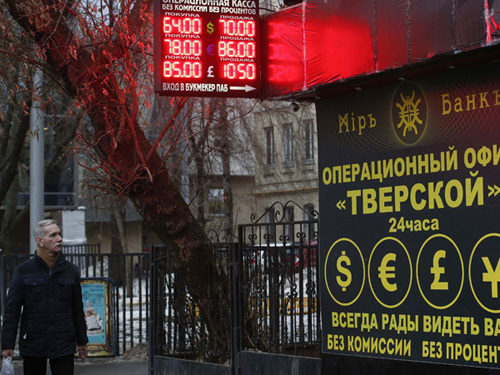
Since the fall in oil prices, a sudden financial turmoil has swept the emerging markets. The Russian ruble has depreciated significantly, and has fallen more than 50% during the year. Russia is caught in the triple predicament of sharp drop in oil prices, European and U.S. sanctions, and tragic selling of various assets.
Regarding the reasons for the devaluation of the current round of Russian ruble, the author believes that first, the drop in oil prices is the core reason. As a resource-enduring emerging market country, the Russian ruble has a correlation with crude oil prices as high as 0.92. The prices of crude oil and its products are crucial to Russia’s exports, fiscal revenue, and even economic growth. Oil and gas-related revenues account for 48% of all fiscal revenues. According to a recent estimate of the Central Bank of Russia, if oil prices average at 60 US dollars in the following year, Russia's GDP will decline by 4.7% in 2015.
Secondly, the fact that the Fed’s interest rate hike is helping boost the dollar’s ​​rise is another reason for the general decline in the currencies of emerging markets. In fact, it is not the Russian family. Since July this year, along with the sudden rise of the US dollar index, the currencies of emerging markets have depreciated to varying degrees. Russia is the most typical example of this. The price of oil has fallen by 45% since June. With the drop in oil prices and the fierce sell-off of various types of assets, the ruble has seriously devalued. The Russian Central Bank turned to raise interest rates to guide, still can not completely curb the decline of the Ruble. In the context of the Fed's imminent rate hike cycle, emerging market bond markets, stock markets, and foreign exchange markets are generally under pressure. With the approach of the interest rate meeting, emerging markets will face greater challenges.
For the crisis in Russia, we have some familiar feelings: In 1998, the collapse of oil prices also caused crude oil-producing countries Russia and Venezuela into a financial crisis. Will the devaluation of the Russian ruble evolve further into an economic crisis? At present, although Russia's current dependence on crude oil is higher than that of 1998, the current political situation in Russia is relatively stable. From the perspective of the proportion of foreign capital in the domestic financial market, the proportion of foreign capital in the Russian financial system has declined. As of July, foreign capital held 19% of shares in the Russian stock market, down from 21% in December last year. The impact of divestment is much less than in 1998. Based on this, the author believes that in 1998, Russia's economic contraction, rising currency, and financial institutions such as domestic commercial banks will be revived. However, the financial turmoil in 1998 will not appear, and the possibility of overall turmoil is currently low.
What is the impact of the devaluation of the ruble on China? The author believes that there are advantages and disadvantages. It is certain that China is very difficult to break out of the Russian crisis. China is a big oil importing country. The drop in oil prices has little effect on China as a whole, but rising economic risks in Russia may be a future for China and Russia. The economic and trade cooperation has had an adverse effect.
On the one hand, China, as the world's largest net importer of crude oil, has an external dependence of more than 58%. The decline in international crude oil prices is conducive to oil imports, which reduces industrial costs and releases long-term benefits for the economy. On the other hand, the devaluation of the ruble and the slowdown of the Russian economy will have an adverse effect on China’s exports. The trade between China and Russia is mainly electromechanical, energy, and raw materials. Most of them are denominated in US dollars. Russia, as an important trading partner of China, will have a direct impact on China’s exports to Russia. Once the ruble continues to depreciate significantly, Russia’s economic and financial collapse will occur. The rising risk is not conducive to the economic and trade cooperation between the two countries. In addition, the plunging of the ruble will also reduce global investor confidence in emerging market countries, and will also cause emerging market countries including China to face the test of capital outflows and the devaluation of the local currency.
Color and pattern, with elegant decorative texture, wear resistance, pressure resistance, chemical corrosion resistance, anti-skid, fireproof, waterproof, etc. It is not only used in industrial floors, but also used in commercial and civil construction floors. Developed countries such as Europe and the United States are very popular, and are known as "color sand seamless hard carpet."
Features:
1. Good mechanical strength, wear resistance, thick coating structure and long life.
Solvent-free Colored Sand Floor
Solvent-Free Color Sand Self-Leveling,Solvent-Free Color Sand Flat Coating,Solvent-Free Colored Sand Finish ,Solvent-Free Colored Sand Floor
Jiangmen Kasole Building Materials Co., LTD. , https://www.kasole-paint.com
